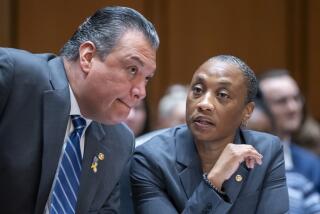Blandishments From the President : A Rebellious 13 Held Fast to End but It Wasn’t Easy
- Share via
WASHINGTON — Almost nothing Thursday would budge the baker’s dozen of breakaway Republican senators who opposed President Reagan on the highway bill: not an extraordinary lobbying trip to the Capitol by Reagan, not offers of special federal aid back home, not pressure from congressional peers, not pleas from big Republican contributors to “support the President.”
Although six of the 13 wavered at the end, offering to switch sides if everyone else did, they wound up supplying exactly the number of votes needed to help solidly united Democrats override Reagan’s veto of the legislation.
It wasn’t easy, they said, to defy a President from their own party who was looking to regain clout lost in the Iran- contra scandal--and who told them at the 11th hour: “I beg you for your vote.”
But the senators argued that the bill was no budget buster, as claimed by Reagan, and that it contained urgently needed highway and mass transit money--plus a popular new 65-m.p.h. speed limit on rural highways--that might be lost if the veto were sustained.
Moreover, they reasoned, the issue had little bearing on the President’s overall prestige.
“The President demonstrated he is very much a strong-willed leader, even in losing,” said Sen. Thad Cochran (R-Miss.), one of the 13 rebels. “Like a field of wild onions, you know he’s there.”
Several of the 13 reported that they had been offered inducements to switch sides on the veto issue.
Cochran said that Administration officials had “hinted at some special benefits” for his state if he agreed to change his position. Sen. Mitch McConnell (R-Ky.) claimed that “I probably could have paved Kentucky” with the inducements he was offered, while a source said that Sen. Christopher S. Bond (R-Mo.) had rejected the offer of a multimillion-dollar agricultural research grant for a university in Missouri.
Like others of the 13, Bond was heavily lobbied, receiving calls from the President, Vice President George Bush and Transportation Secretary Elizabeth Hanford Dole, wife of Senate Minority Leader Bob Dole (R-Kan.).
Troops to Capitol
However, after the calls failed to pick up the single vote Reagan needed to win, the President boldly trooped to Capitol Hill Thursday morning to meet with all 46 Republican senators in the elegantly restored original Senate chamber.
At a low-key, 43-minute follow-up session in Dole’s office, Reagan personally pleaded to the rebellious 13. Also on hand to step up the pressure was Howard H. Baker Jr., Reagan’s new chief of staff and former Senate Republican leader.
Reagan offered no deals, sources said, but quoted a Scottish ballad--”I am wounded but not slain. I will rest awhile. But I will rise to fight again.” He went on to say: “It’s time for all of us to fight again.” He repeated his arguments against the bill, noting that a plan he had proposed would provide more money to many states.
Difficult to Oppose
In response, the senators earnestly spoke their concerns and told how difficult it was to go against the President, White House spokesman Marlin Fitzwater and other sources said. But, in the end, they said no.
Sen. Pete Wilson (R-Calif.), who voted to override the veto, said he told Reagan that it was “a painful thing for me to have to disagree with an old friend and gifted leader. . . . The President was gracious about it. He said he was sorry we disagree.”
An aide said Wilson feared that the Los Angeles subway project would lose much of the $870 million authorized for it in the highway bill--and strongly opposed by the Administration--if the veto were sustained. Also, the aide said, California urgently needs millions in federal highway funds, which ran out this month. Moreover, Wilson wanted to protect 15 so-called demonstration projects that Reagan had attacked as wasteful “pork.”
Note House Threat
Wilson, Sen. Chic Hecht (R-Nev.) and Sen. Steve Symms (R-Ida.) expressed concern about losing a provision in the highway bill that would raise the 55-m.p.h. speed limit. They noted that a group of House members had threatened to switch sides and provide the decisive votes against raising the speed limit if the veto were sustained.
Sen. Larry Pressler (R-S.D.) said he supported the bill because it increased the federal highway allocation for his state by 10% over last year and provided for three demonstration projects, including a new road to Mt. Rushmore National Memorial.
“It was not a pleasant experience for anybody . . . to tell the President of the United States in front of the Republican caucus that you have to say no,” Pressler said. “I love Sen. and Mrs. Dole and I love the President, but I also love South Dakota. It made my lunch hard to digest.”
One Last Try
After Reagan failed to win any converts on his trip to the Capitol, Sen. Dole made one last try with the 13. He asked how many would be willing to switch their votes if all were willing to do so. His safety-in-numbers proposal apparently was designed to buffer any criticism of the switches.
Dole said that only six hands went up--he declined to identify them--signaling that it was a lost cause.
More to Read
Get the L.A. Times Politics newsletter
Deeply reported insights into legislation, politics and policy from Sacramento, Washington and beyond. In your inbox twice per week.
You may occasionally receive promotional content from the Los Angeles Times.










